Introduction
Do Rats Hibernate: Rats are fascinating creatures known for their adaptability and resilience. While many animals hibernate to survive harsh environmental conditions, rats, including common species like the brown rat (Rattus norvegicus) and the black rat (Rattus rattus), do not hibernate in the traditional sense. Instead, they employ various strategies to endure colder seasons and scarcity of food without undergoing true hibernation.
Unlike true hibernators, such as bears or ground squirrels, which experience a dramatic reduction in metabolic rate and body temperature, rats maintain relatively stable body temperatures throughout the year. This allows them to remain active and forage for food, even in cold weather.
Rats are opportunistic feeders, and they are skilled at finding and storing food, often building nests and caches in their burrows or sheltered areas to ensure a steady food supply during the winter months. They also exhibit behavioral adaptations like increased nesting activity, reduced exploratory behaviors, and decreased reproduction rates during winter to conserve energy.
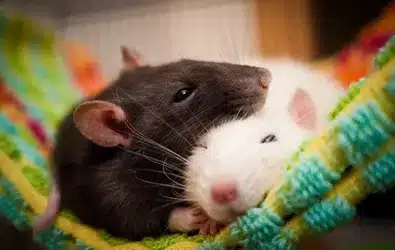
What happens to rats in the winter?
Cold weather naturally requires rats to seek shelter from the elements and man-made buildings provide the perfect resource. When the weather gets really cold, rats are forced to flee their normal habitats straight into warm and dry buildings: houses, warehouses, barns, shops, office buildings – wherever they can.
Rat Adaptations: Rats, such as the common brown rat and black rat, employ a variety of strategies to endure the challenges of winter without undergoing hibernation. These strategies can be divided into several key aspects.
Stable Body Temperature: Unlike hibernating animals that undergo drastic reductions in body temperature, rats maintain a relatively stable core temperature throughout the year. This enables them to stay active even in colder conditions.
Foraging Behavior: Rats are opportunistic feeders and continually search for food. During the winter, they become more aggressive in their foraging, often venturing closer to human settlements in search of sustenance.
Food Storage: Rats are skilled at finding and storing food. They create caches in their burrows or sheltered areas, ensuring they have access to a food supply when resources become scarcer in the winter months.
Nesting Activity: To conserve energy and stay warm, rats increase their nesting activity during winter. They construct warm and insulated nests in protected locations, such as burrows or building structures.
Reduced Reproduction: Rats often decrease their reproductive activity during winter. This helps conserve energy and resources that would otherwise be expended on raising offspring.
Are rats active in the winter?
These rodents stay active throughout the winter. And if the conditions in your home are hospitable, they may very well decide to move their activities inside your house.
Activity and Behavior: Rats, notably the common brown rat (Rattus norvegicus) and black rat (Rattus rattus), exhibit distinctive behaviors and activity patterns in response to the changing environmental conditions during winter months. Understanding how rats behave during this season is essential for pest control and management.
Reduced Activity: While rats do not hibernate, they tend to be less active during winter. This is primarily due to the colder temperatures and reduced availability of food sources. They conserve energy by limiting their movement and foraging.
Nocturnal Activity: Rats are primarily nocturnal creatures, and this behavior is particularly pronounced in the winter. They become more active during the night when temperatures are relatively warmer.
Increased Foraging: Although less active, rats become more desperate for food during winter. This may lead them to venture closer to human habitations in search of food, potentially increasing encounters and conflicts with people.
Nesting Behavior: To combat the cold, rats increase their nesting activity in winter. They build well-insulated nests in burrows, attics, walls, and other sheltered areas to stay warm and conserve energy.
Mating and Reproduction: Rats tend to have fewer litters and reduced reproductive activity in winter due to the scarcity of resources. However, in warmer urban environments with consistent food sources, breeding can continue year-round.
Do domestic rats hibernate?
Rats, mice and other rodents live in wilderness and domestic environments and do not typically hibernate during the winter months. During the cold months rats are in search of a warm place where they can find shelter and protection from predators.
Domestic Rats and Hibernation: The Truth Domestic rats, also known as fancy rats (Rattus norvegicus domesticus), do not hibernate. Unlike some wild rat species that may employ hibernation or torpor-like states in response to extreme environmental conditions, domestic rats have lost this ability through centuries of selective breeding.
Genetic Modification: Over generations of domestication, selective breeding has led to significant genetic changes in domestic rats. These changes have resulted in a loss of hibernation-related behaviors and adaptations present in their wild counterparts.
Constant Environment: Domestic rats are typically kept in controlled indoor environments where temperature and food availability remain relatively stable throughout the year. This negates the need for hibernation, which is primarily a response to temperature fluctuations and seasonal food scarcity.
Active Year-Round: Domestic rats remain active throughout all seasons, similar to their wild counterparts in temperate regions who do not hibernate either. They continue to eat, play, and engage in their usual behaviors regardless of the time of year.
Energy Conservation: Domestic rats may adjust their activity levels to some extent in response to changes in temperature and daylight hours. Still, they do not enter a true hibernation state characterized by a dramatic drop in metabolic rate and body temperature.
What smell keeps rats away?
Rats are not comfortable with the smell of peppermint oil, lavender oil, eucalyptus oil, lemon oil, or cedarwood chips. This smell triggers their brain to recognize danger and will drive them out of your home quickly!
Effective Smells: Rats are known for their keen sense of smell, and certain odors can deter them from invading homes, businesses, or gardens. While no smell is an absolute guarantee to keep rats away, some scents have proven to be more effective at discouraging their presence.
Peppermint Oil: Peppermint oil is a popular natural rat repellent. Its strong, minty aroma can overwhelm a rat’s sensitive olfactory system, making the area less attractive to them. Simply soak cotton balls in peppermint oil and place them strategically in areas where rats might enter or hide.
Ammonia: The pungent smell of ammonia can be an effective rat deterrent. Soaking rags or cotton balls in ammonia and placing them in rat-prone areas can help discourage them from entering.
Eucalyptus Oil: Rats dislike the smell of eucalyptus oil. Mixing a few drops of eucalyptus oil with water and spraying it in rat-infested areas can create a hostile environment for them.
Mothballs: Mothballs contain naphthalene, a chemical with a strong odor that rats find unpleasant. Placing mothballs in crawl spaces, attics, or other rat-prone areas can deter them, but be cautious with their use, as they can be toxic to humans and pets if ingested.
Cayenne Pepper: The spicy scent of cayenne pepper can also be effective. Sprinkle it in areas where rats are a problem, but be prepared to reapply after rain.
What attracts rats to your house?
There are two main things that can attract mice and rats to your house – food and shelter. If you don’t tidy up properly and there’s food waste on the floor or surfaces, rodents are going to love it! Rats and mice also need shelter, particularly during winter to avoid the worst of the cold.
Rat Attraction to Homes: Understanding the Factors
Rats are opportunistic creatures that can find their way into homes and buildings for various reasons. Understanding the factors that attract rats is essential for effective pest prevention and control.
Food Sources: The availability of food is a primary attractant for rats. Leaving uncovered trash, open food containers, or pet food accessible can provide an easy and consistent food supply for them.
Shelter and Warmth: Rats seek shelter and warmth, especially during cold weather. Gaps or cracks in walls, roofs, or foundations can provide easy access for rats to enter and find refuge in your home.
Water Sources: Just like food, rats need water to survive. Leaky pipes, standing water, or even pet water bowls can be attractive sources of hydration.
Clutter and Nesting Materials: Cluttered and undisturbed areas, both inside and outside a property, provide rats with excellent nesting opportunities. They often build nests using materials like paper, fabric, and insulation.
Unkempt Yards: Overgrown vegetation, piles of debris, or neglected outdoor spaces can create ideal hiding spots for rats. These areas provide cover and make it easier for rats to approach a property unnoticed.
Easy Entry Points: Rats are skilled at squeezing through small openings. Gaps around doors, windows, vents, and utility penetrations can serve as entry points, allowing them access to your home.
What is the lifespan of a domestic rat?
Rats typically have short life stages. Domesticated pet rats normally only live 2-4 years–but the longest living rat in captivity lived to be 7 years old! A pet rat’s life expectancy is much better than their wild counterparts, though, who typically live less than a year.
Lifespan of Domestic Rats: Factors and Average Duration
The lifespan of a domestic rat, also known as a fancy rat (Rattus norvegicus domesticus), can vary based on several factors. These factors play a significant role in determining how long a domestic rat is likely to live.
Genetics: Genetics plays a crucial role in determining a rat’s lifespan. Rats from reputable breeders with a history of healthy breeding tend to live longer than rats from unknown or less responsible sources.
Diet and Nutrition: Proper nutrition is essential for a rat’s health and longevity. A well-balanced diet that includes high-quality rat pellets, fresh fruits, vegetables, and occasional treats can contribute to a longer life.
Housing and Environment: Rats kept in clean, spacious, and enriched environments tend to thrive and live longer. Good living conditions help prevent stress and disease.
Veterinary Care: Regular veterinary check-ups and prompt treatment of any health issues can extend a rat’s lifespan. Routine vaccinations and preventive care are crucial.
Socialization and Companionship: Rats are highly social animals and benefit from the companionship of other rats. Living with cage mates can improve their overall well-being and longevity.
What smell do rats fear?
Peppermint oil is an effective method for keeping mice and rats away. These rodents cannot stand this oil’s robust and minty smell, so a few drops around your home can go a long way in keeping them away.
Scents That Deter Rats: Understanding Rat Aversion rats have a well-developed sense of smell, and certain odors can be repulsive to them. While it’s important to note that no scent is guaranteed to keep rats away, some smells are known to deter them to varying degrees.
Peppermint Oil: The strong, minty scent of peppermint oil is a well-known rat repellent. Rats find this odor overwhelming and often avoid areas where it is prevalent. Placing cotton balls soaked in peppermint oil in rat-prone areas can be effective.
Ammonia: Ammonia has a pungent odor that rats dislike. Mixing ammonia with water and placing soaked rags or cotton balls in strategic locations can discourage rat activity.
Eucalyptus Oil: Rats have an aversion to the scent of eucalyptus oil. Spraying a mixture of eucalyptus oil and water in areas where rats are a problem can create an unwelcome environment for them.
Cayenne Pepper: The spicy smell of cayenne pepper can also deter rats. Sprinkling cayenne pepper in areas where rats frequent may discourage them from staying.
Mothballs: Mothballs contain naphthalene, a chemical with a strong and unpleasant odor for rats. However, it’s important to use mothballs with caution, as they can be toxic to humans and pets if ingested.
How do you keep rats away permanently?
Most rats require a constant water source and they tend to stay around these sources. It’s necessary to remove, cover, or repair any sources that provide a water source for these rodents. This includes swimming pools, leaky faucets, irrigation lines, water bowls for pets and other sources of standing water.
Permanently Keeping Rats Away: Rats can be persistent pests, but with a combination of proactive measures, you can effectively keep them away from your property for the long term. Here are key strategies to achieve rat-free living:
Seal Entry Points: Inspect your home for any gaps or openings that rats could use to enter. Seal these gaps with materials like steel wool, caulk, or metal mesh. Pay close attention to areas around pipes, vents, doors, and windows.
Maintain Cleanliness: Eliminate potential food sources by keeping your home and surroundings clean. Store food in airtight containers, promptly clean up crumbs and spills, and securely dispose of trash. Pet food should also be stored in sealed containers.
Remove Outdoor Attractions: Keep your yard and garden tidy by removing clutter and debris that rats could use for shelter. Trim overgrown vegetation and keep firewood piles elevated and away from the house.
Rat-Proofing: Use rat-proofing techniques to protect your home. Install metal grates or screens over vents and chimneys, and consider installing door sweeps to prevent rats from squeezing under doors.
Rat-Resistant Landscaping: Choose rat-resistant landscaping materials and avoid dense, ground-level vegetation near your home. Rats are less likely to take up residence in a well-maintained garden.
Regular Inspections: Conduct regular inspections of your property to identify signs of rat activity early. Address any issues promptly to prevent infestations from taking hold.
Use Rat Traps and Baits: In cases of infestation, employ rat traps or baits as needed. Snap traps and electric traps are effective for capturing rats, while bait stations with rodenticides can be used with caution.
Seek Professional Help: If rat problems persist or become severe, consult with a professional pest control service. They have the expertise and tools to address complex infestations effectively.
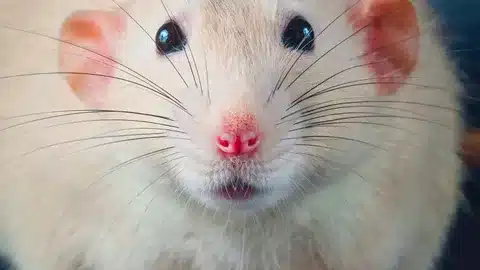
Conclusion
Rats do not hibernate in the traditional sense, as they maintain relatively stable body temperatures and remain active throughout the year. Instead, they employ a range of adaptive behaviors to survive colder seasons and periods of food scarcity. These adaptations include storing food, increased nesting activity, reduced exploration, and decreased reproduction rates. Rats’ ability to thrive in various environments and their resourceful strategies for enduring adverse conditions contribute to their reputation as highly resilient and adaptable rodents.
Rats’ unique survival mechanisms have helped them become one of the most widespread and successful rodent species globally. Their adaptability to different climates and habitats, coupled with their resourcefulness, allows them to persist in urban, suburban, and rural environments alike. This adaptability has, unfortunately, made rats a common pest in many areas, as they can exploit human settlements for food and shelter.
It’s worth noting that while rats don’t hibernate, they can still face challenges during harsh winters or periods of food scarcity. In such situations, they may resort to more aggressive foraging behaviors, potentially leading to increased conflicts with humans and other animals. Additionally, their presence can pose health risks due to the transmission of diseases and the damage they can cause to property.

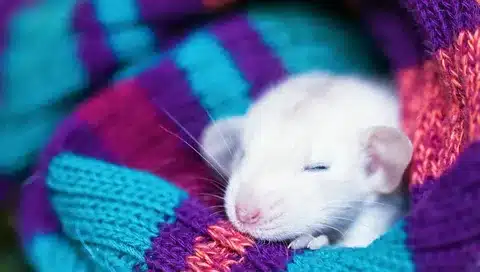
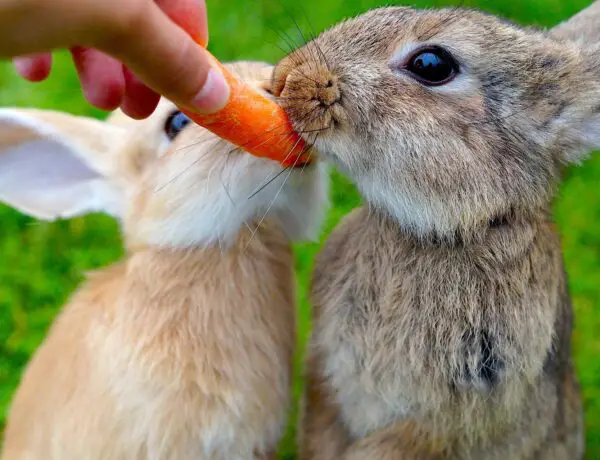

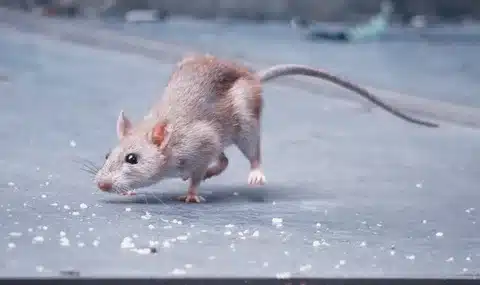
No Comments